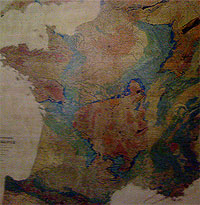In Between
Listening to the French passengers waiting to board the airplane, I feel a kinship with them. They are leaving the land of large portions and loud talkers to return to the subtler world of degrees of humor and real cheese. It sounds like they’ve all had a pleasant holiday, but most of them look relieved to be returning to more familiar soil.
I love the lyrical sound of the banter between them. French is a language I can understand, but only if I am listening deliberately. If I choose to zone out, conversations can swirl around me without penetrating my consciousness. This is impossible in my mother tongue of American English; I am too easily distracted by peripheral conversations which, in French, are more like background music.
Each time I visit the United States, I am initially assaulted by this capacity to understand everything I hear. I become an unwilling eavesdropper. I don’t want to hear how much that guy had to drink last night or how much she spent on her Manolo Blahniks but I am obliged, not only because of the volume of these not-necessarily-nearby discussions but due to the fact that I understand them instantly: it’s all in my mother tongue.

Yet back in France, surrounded by the less optimistic language of French with its more subtle nuances and accompanying gestures of skepticism – the French shrug for one – I tire of never-quite-fully understanding everything, or on the other hand, the need of certain French speakers to explain things to me so thoroughly without noticing that I got the point a whole paragraph ago. In France, I feel other and yet sitting in this American airport lounge, waiting to board an overnight flight, I feel a solidarity. I’m one of them and we are going home.
Short-pants and Buddy-roo have their unique appreciation of the two languages. Passport carrying Americans they are, but they move between French and English with ease, just as they navigate the cultural nuances. Short-pants’ command of the language is correct, this becomes more apparent each year as her automatic capacity to align nouns with their feminine or masculine articles puts me to shame. She and I have reached an agreement: I am delighted for her corrections as long as they are gentle admonishments offered privately in the spirit of assistance rather than in public with embarrassed disdain. She’ll touch my arm softly and whisper, “Mama, you said un and it should be une.” I am honestly grateful for her assistance when offered in this fashion. I’m pretty sure Buddy-roo will not follow suit. My charming little mistakes will be the cause of eye-rolls and giggling behind cupped-hands with all of her French-speaking friends.
Our girls are native speakers, even with English as their mother tongue. Since it’s not the primary language spoken in our home, their French vocabulary is a bit behind that of their classmates, but their pronunciation is native. This assured by attending French schools since the tender-eared age of three. What a gift we give them. Even if we were to leave France next  week to live somewhere else (a new adventure is always in our minds, but to where?) they will always be able to speak French like a local. Twenty years on it might require a small amount of study to recall the sentence structure and vocabulary, but the accent has been embedded. They will always sound French.
week to live somewhere else (a new adventure is always in our minds, but to where?) they will always be able to speak French like a local. Twenty years on it might require a small amount of study to recall the sentence structure and vocabulary, but the accent has been embedded. They will always sound French.
Beyond language, though, what nationality are they? Born on French soil, but of American blood, they ultimately get the right to be both, if they choose. I once asked Buddy-roo if she felt more American or French. “Française,” she said, turning on her toes and sauntering out of the room. (She seems to have mastered the French art of being a coquette.)
Having lived outside my own country for eighteen years, I find myself in the occasionally awkward stance of feeling in between cultures. I am an American. At the core of my beliefs is the idea that you can do whatever you dream if you set yourself to it, that one is not bound by class or caste to any destiny, that a little ingenuity and perseverance will get you where you need to go. Americans don’t own this mindset uniquely (nor is it a truth for everyone in our country), but perhaps we aspire to it more organically than other cultures. But I think I’ve become an American of another generation, that having left the county a week before Bill Clinton was elected President (though I did vote, absentee), I feel out of touch with a lot of what’s happening now in the United States. I don’t understand the vitriol of our political discourse. I can’t believe the problem with obesity or the number of drug stores per capita. I’m stunned by the absolute consumerism and dismayed by the circus that is television news. It’s not the America I pledged allegiance to every morning in school, when I was growing up, and I’m not entirely sure it’s the America I’d want the girls to call their home.

So I am in between. Often in transit.
I can take advantage of my American passport to enter my home country more swiftly than international tourists. But once beyond the customs agent, I do sometimes feel other. This is not an angst-ridden other; I enjoy visiting and I appreciate my home country as much as I’m perplexed by it. But it means I’m not entirely rooted anywhere, which is a bit liberating. I’m hoping our girls can absorb this, to see the benefits and drawbacks of both of their cultures – of any culture they hope to visit – and to study them as interesting rather than judging them as superior or inferior. This is the opportunity of living in between, the capacity to observe and appreciate everything: French, American, or other.


September 22nd, 2010 at 5:49 pm
hmm, this post has me thinking…a lot. The issue of language…I was fluent in German and spoke like a native when I left home at 17 and no longer am and when I do manage some German I have a British accent! I speak French, my mothertongue also with a ‘strange’ accent (Belgian, they say…). And the accent changes according to how much of the other language I speak…
As for the ‘in-between’ feeling, I get it completely. It took me years to get used to the British way of life and to call it ‘home’. And I think this leads me to the most important aspect of this in-betweeness: the pervasive need to ‘belong’. And I now feel I belong where I make my ‘home’. Personally, I think this is the gift we give our children: the ability to ‘belong’ wherever they make their home…
Interestingly also, I am finding myself thinking of our place in Michigan as my real home long-term, the place I have always belonged to even when I didn’t know it. High Wycombe is Arthur’s home and my work place…so I am always sad to return to Europe from Michigan! I now believe that Americans are largely misunderstood in Europe, I have said for the last 3 years that there is a book I could write about that! Just been discussing perceptions of American brands in former Eastern Germany with a client this pm… Now, I feel like the ferry girl between Europeans and Americans…
Thank you for spurring on the thinking here…
Caroline
September 22nd, 2010 at 7:42 pm
I love your writing. It is so descriptive and thought provoking.
I think children have a greater need to belong and so it’s no surprise that they choose france. I’m sure they will love their rich background as time goes on.
M2Mx
September 22nd, 2010 at 8:54 pm
funny, cause i had this “in between” feeling when i was “travelling” between my three houses (nope I wasn’t a rich girl, just getting divorced). One week, I was living in “the gorls” flat, the former family home. The other, I was sleeping either at my lover’s flat or in my tiny little place I had to lend when we got seperated with my daughters’ father. And I was feeling home nowhere. There was my girls’ place, my lover’s place, the “to wait” place. I waa living constantly with a suitcase.
And I totally felt “in between”. Till that period, I never felt it was so important to have a place you can call home. Now I have one : not my daughters’, not my lover’s, mine. And feeling strongly it is home for me, it became home for them.
But now, my daughter’s have to be “in between” their two houses. As you say, I hope they’ll “see the benefits and drawbacks of both of their cultures – of any culture they hope to visit – and to study them as interesting rather than judging them as superior or inferior.” (cause actually, their father and I show them differents cultures, if both French)
September 23rd, 2010 at 1:10 am
Believe me, a lot of us who live here don’t know what to make of what’s going on either. And are equally disconcerted by it, to say the least.
September 23rd, 2010 at 2:47 am
This notion/creative force of “in between” has been coined “TCK” or “TCA”, by many who have been global before global was even considered “in between”. ” TCK” is with whom I live everyday in my international classroom, “Third Culture Kid”, and it yells loud and clear and with a fierce force in many languages, and cultures. “TCA” is with whom I live every day in my international staff room,”Third Culture Adult”, and it yells/complains loud but perhaps not so clear and with a force in not as many languages and maybe fewer cultures…. google TCK and TCA and see what happens. sort of like TED, definitely ideas worth spreading!
September 27th, 2010 at 8:45 am
Thanks for this — I had not heard the terms before. I went to Google, as you suggested; there were plenty of interesting links. Much to my amazement, one of the clearest explanations was on the US Dept of State website: (http://www.state.gov/m/dghr/flo/c21995.htm ) I found this extremely satisfying! Thanks J. I’ll see YOU in Paris very soon.
September 23rd, 2010 at 3:54 am
Well you really have expressed how I basically feel when leaving and returning to the US. Jim and i have been traveling since 1978 and the first thing we noticed back then was how noisy it is when we return home. Now I must agree to all the rest that you stated, although, cable/satellite tv has really allowed the planet to see and become more like people behave here. That is discouraging to me since that was part of the reason I loved traveling around our planet. Thanks and keep on writing.
September 23rd, 2010 at 9:48 am
So perfectly said. There are many of us who understand exactly, this sense of liberation from place.
September 23rd, 2010 at 4:14 pm
Oh, you put into words the way I feel. About how we can love SO MUCH about our native country, but feeling slightly alienated there. Yet not totally rooted here in Europe either. I have a hard time trying to figure out where to settle, and even though I’m single and without kids I definitely give thought to where I’d want my future kids to grow up. It’s tough. Right now I don’t have the answer. But I’ll say this, your girls are very lucky. Not only because they are learning fluent French and adding on many extra years to their lives thanks to the French diet (or better yet, the LACK of American diet), but more importantly because you guys are incredible parents. I don’t really think it matters where they are, as long as they have you two guiding them through their young lives and encouraging their curiosities and passions. You guys have always inspired me!!!
Big kiss from your southern neighbor.
xoxo Regan
September 27th, 2010 at 3:06 am
as a well traveled american now rooted in sunny southern california with a mortgage and family, i feel the same ‘in between’ as i try to avoid and resolve myself with the churning culture america hosts. it is so hard to do, i feel my desire to interact with this odd rapid culture slips away and i want to craft and create a space for my children to grow and thrive without their influence. The conundrum is how when one lives squarely planted in the drug store and obesity and consumption.
i do believe we can but i also dream of the life of a gypsy where we could pack and leave and traverse the world with these little boys in tow, opening their eyes as our were so many years ago.
oh, how i love your posts, woman. they are so rich and lovely and always leave me thinking.
September 27th, 2010 at 4:35 pm
How interesting and relieving to read post/comments. I’ve been TCA without knowing it and so have been my grandparents before me (in between Italy/Argentina).
Funny thing: I have a strange accent in Italian, now I have a funny italian accent when I speak spanish, but in english it is quite difficult to guess where I’m from! maybe I need to belong and I chose english as my “in between”
great book about us all: “L’ignorance” by Milan Kundera! 🙂
September 29th, 2010 at 1:06 pm
Oh, but you give me such wanderlust.
October 5th, 2010 at 1:20 pm
I can relate to this very easily.
I once had to define what all my previous jobs had in common and while there wasn’t much that was evident, bridging gaps, mostly communication ones, was what came to mind.
The one thing I can say has -more than anything else- made my career (and personal life) possible has been without doubt mastering English, which was greatly helped by having more than one language as a kid.
The most important inheritance of this multiculturalism you’re giving them is the certainty, in this increasingly polarized world, that there is an “other” and that is just as rooted in reason, emotion and life as any “other” (pun intended).
It will be much harder to make them follow the us and them mentality.
Thanks for this. They’ll thank you guys as well. It’s pure richness.